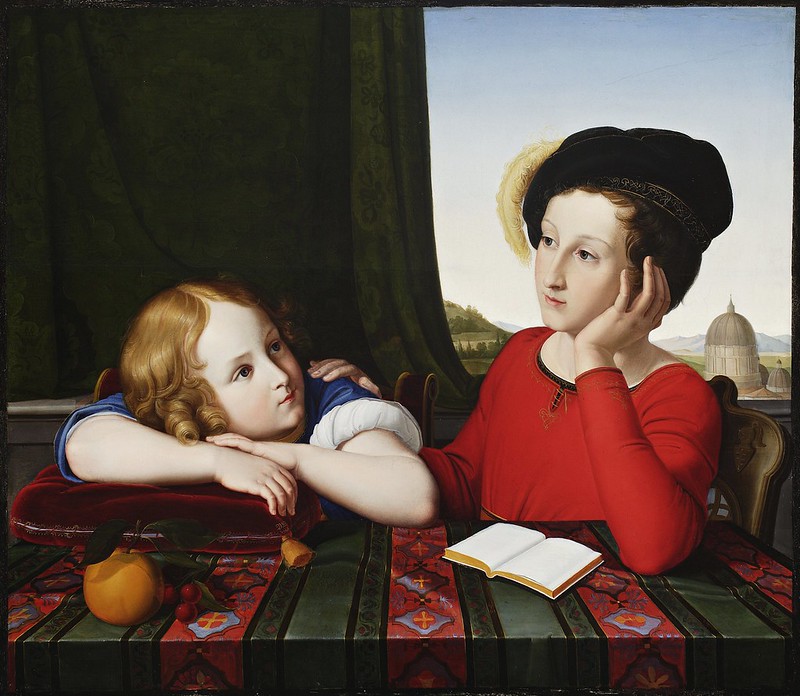Carl Otto Nicolai (1810-1849) - Te Deum (1832)
Performers: Annika Ritlewski (sopran); Julia Giebel (sopran); Vanessa
Barkowski (alt); Volker Arndt, (tenor); Ingo Witzke (tenor); Tobias
Berndt (bass); Andreas Sieling (orgel); Sing-Akademie zu Berlin; Staats-
und Domchor Berlin; Berliner Domkantorei; Kammersymphonie Berlin;
Kai-Uwe Jirka (conductor)
Further info: Carl Otto Nicolai (1810-1849) - Messe D-dur (1832)
---
German composer and conductor. He was the first child of the composer
Carl Ernst Daniel Nicolai (1785-1854) and his wife Christiane Wilhelmine
(née Lauber). Because of his mother’s physical and mental illness, the
marriage was dissolved a few months after Nicolai’s birth. He grew up in
the care of foster-parents until 1820, when his father took on
responsibility for his education. Nicolai attended the highly regarded
Friedrich-Gymnasium in Königsberg, but became so strained by his
father’s attempts to make a prodigy of him that at the age of 15 he
suffered a complete breakdown and had to leave. In mid-February 1826 he
ran away and travelled via Memel to his mother in Breslau. She, however,
was unable to look after him, and for the next two years he eked out a
living as an itinerant pianist. After falling seriously ill in Stargard,
he was helped by a local military court judge. The judge sent Nicolai
to Berlin, where he was introduced to Carl Friedrich Zelter. Zelter
resolved to support Nicolai and obtained for him a place at the Institut
für die Ausbildung von Organisten und Musiklehrer, where he received
tuition from Emil Fischer (singing), Ludwig Berger (piano) and Bernhard
Klein (composition). The Prussian ambassador Karl von Bunsen eventually
persuaded Nicolai to move to Italy. From January 1834 to March 1836 he
held the post of organist at the embassy chapel in Rome. At the same
time he studied counterpoint and a cappella style with Giuseppe Baini,
acquired the nucleus of his considerable collection of early music and
took a lively interest in the development of contemporary Italian music.
When his period of employment came to an end he had already been
nominated honorary music director of the Prussian court, but he stayed
on in Italy as a freelance composer for more than a year, searching in
vain for a commission to write an opera. Apart from composing a few
occasional works, the only success of these years was his appointment to
the Accademia Filarmonica in Bologna as maestro compositore onorario.
After many disappointments he was eventually elected assistant
Kapellmeister at the Kärntnertortheater in Vienna in 1837. There he
gained experience in conducting opera and orchestral works and he
composed his first opera, 'Rosmonda d’Inghilterra' which provided him
with his first success as a composer in Vienna and Italy. Then he
attempted to settle in northern Italy as a freelance composer but some
personal disagreements and the failure of his engagement to the singer
Erminia Frezzolini caused Nicolai to leave the country in spring 1841,
and once again he was drawn to Vienna. After his experiences in Italy,
Nicolai soon changed his artistic ideals. In late summer 1841 he was
appointed principal conductor of the Hofoper at the Kärntnertor, and was
able to concentrate on the operas of Mozart and Beethoven, which he
particularly admired. Required by contract to compose German operas, he
provided his first original German opera, 'Die lustigen Weiber von
Windsor'. In summer 1844 Nicolai undertook a long journey via Prague,
Dresden, Leipzig and Berlin to Königsberg, where he performed the
Kirchliche Fest-Ouvertüre which he had dedicated to his native town, as
part of the festival to celebrate the 300th anniversary of the
university. King Friedrich Wilhelm IV of Prussia was so impressed that
he tried to tempt him to Berlin; Nicolai, however, did not at first
respond to the offer. October 1847 saw him installed as Kapellmeister at
the Königliches Opernhaus in Berlin and, as Mendelssohn’s successor,
artistic director of the cathedral choir. Wishing to reform Prussian
church services, he immediately began to compose a series of large-scale
religious works. Soon afterwards Nicolai joined the Tonkünstlerverband,
a society concerned with the reorganization of Prussian musical life;
Die lustigen Weiber eventually received its première, without huge
success, on 9 March 1849. Two months later, on 11 May, Nicolai died. On
the same day he was elected a member of the Akademie der Künste, but too
late to receive the news.

Cap comentari:
Publica un comentari a l'entrada